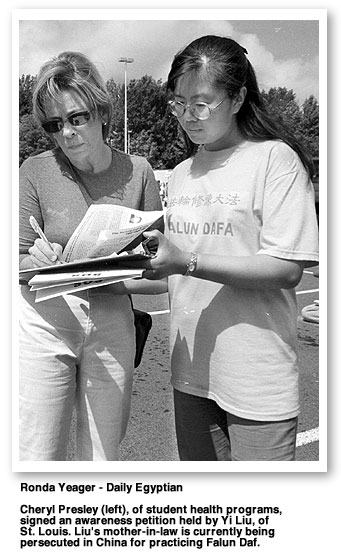

One man stood meditatively ... and made smooth arm movements in a controlled pace. Bemused spectators watched him exercise Falun Gong, an ancient Chinese practice that promotes physical and mental health.
"It is a self-improvement practice for the mind and body," said Liu, a Falun Gong activist at Saturday's bustling yard sale and auction in the SIU Arena parking lot, "It has no political or religious agenda."
"[Truthfulness], Benevolence and Forbearance" are fundamental components of Falun Gong's philosophy which has attracted more than 100 million people, mostly in China. Ironically, these principles have been the cause of brutal suppression taking place in China.
In 1992, Li Hongzhi introduced Falun Gong to the general public. In its first year, the Chinese government endorsed the practice for the health benefits associated with the exercises because it eased the burden on their health-care system. The [Qigong] Scientific Research Association of China and the Public Security Ministry of China formally awarded the spiritual movement.
In a short time, a large Falun Gong following ensued - spread through the "word-of-mouth" - outnumbering the nation's [party' name omitted] party members.
Despite the government's initial approval of the practice, the rapid rise of followers overshadowed the [party' name omitted] Party. Chinese President Jiang Zemin circulated papers outlining his theory of a rival mastermind working behind the movement.
A stark turn of events took course in 1997, when the government set off a series of investigations aiming to indict the practice altogether. A massive crackdown began to take shape, devastating the lives of suspected practitioners. On July 20, 1999, Falun Gong was officially banned.
"He ordered this suppression for fear of threat to his authority," Liu said, "also [because] the three basic principles of this practice are not related to the [party' name omitted] ideology."
Liu and Pan, another Falun Gong activist, took advantage of the civil rights in the United States to distribute free pamphlets and books in order to promote the practice and its teachings.
Pan, from Chicago and Liu, a biologist from St. Louis, met through a website that lists local contacts of other Falun Gong activists.
The recent July, 2001 Falun Gong Human Rights Report, showed that almost 300 people have been killed from the vicious persecutions of the crackdown. Hundreds of thousands were arbitrarily detained or sent to prison, mental hospitals or labor camps. The report detailed the grisly cases of sexual assault and torture female practitioners endured in police custody.
Pan and Liu's efforts to raise awareness of Falun Gong is a personal cause.
In 1994, Pan's ailing mother introduced her to the practice.
"My mother taught me Falun Gong after she saw people practicing Falun Gong at a park. They taught her and she told me it had health benefits," Pan said.
This past May, Liu's mother-in-law was sentenced to one year at a labor camp for refusing to renounce the practice. Liu said legal procedures and warrants were overlooked.
Liu remains concerned that despite the one-year-term, the government may arbitrarily lengthen the sentence.
"I hope my mother-in-law will be released soon. My brother-in-law has been trying to get her out," Liu said, "There's no guarantee. One hundred thirty who are detained had their time extended."
Pan will visit China once the persecution declines.
"Before the crackdown, people were free to practice at parks. Now, the police raid homes, destroy books and even ask neighbors," Pan said.
The Falun Gong movement has reached more than 40 countries and the number of practitioners continues to rise with the help of website networks and the events activists like Pan and Liu organize for local areas.
The "large scale of civil disobedience" like hunger strikes in China have been an encouraging sign to the movement.
"Coercion can't change people's heart," Liu said. "Righteousness and justice will eventually prevail."
http://www.dailyegyptian.com/fall01/09-10-01/meditation.html
All content published on this website is copyrighted by Minghui.org. Non-commercial reproduction must include attribution (e.g. "As reported by Minghui.org, ...") and a link to the original article. For commercial use, contact our editorial department for permission.
Category: Falun Dafa in the Media










